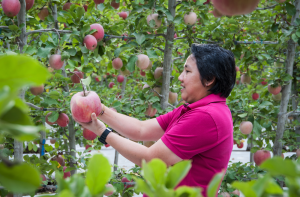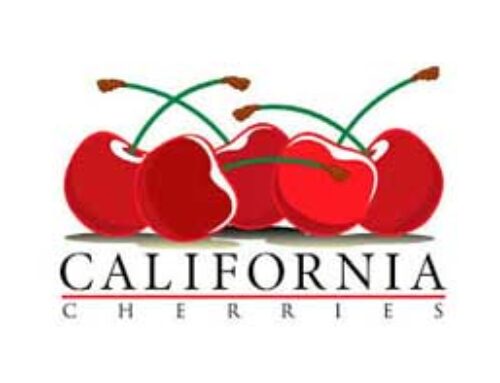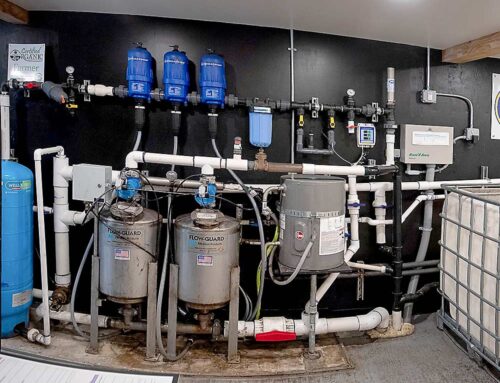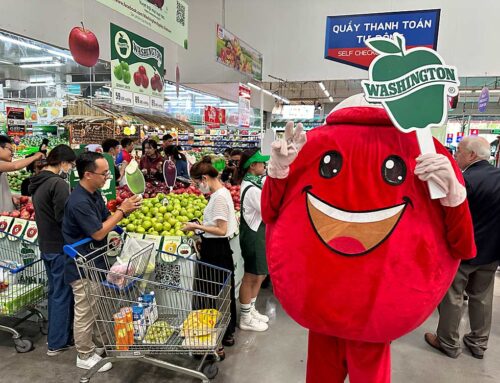With a record crop of Washington apples, estimated at 140 million boxes or more, Todd Fryhover is hoping to see a significant boost in exports this season.

Tulip Phanuroote, the Washington Apple Commission’s representative in Thailand, admires an apple at Auvil Fruit Company’s orchard at Vantage during a visit to Washington. (Courtesy Washington Apple Commission)
Last year, when the industry produced 118 million boxes, 37 million went to export markets.
Fryhover, who is president of the Washington Apple Commission, says he’s hoping to see 60 million boxes exported this year, though he’ll settle for anything over the mid-50s.
This was the message he gave to the commission’s 21 international representatives who converged on Wenatchee, Washington, this week to tour orchards and packing houses and gear up for a busy season of promoting Washington apples.
At the commission’s board meeting on October 14, which the international representatives attended, Fryhover said there are positive trends, despite the need to move a big crop.
The commission will receive $5.2 million in federal Market Access Promotion funds to spend in international markets this year, an increase of almost $600,000 from last year.
An increasing proportion of the crop is made up of new varieties developed to suit the preferences of today’s consumers.
“We have an apple for everybody,” he said. “We have the good fortune that we can provide a product that people want. To go out and to have a symbol of health and nutrition in your hand—the product sells itself. Yes, we have a few challenges, but the glass is half full.”
Board member West Mathison, president of Stemilt Growers, Wenatchee, said no matter where you go in the world, Washington apples are firmer, shinier, and hold up better at the retail store than apples from other regions. And, this year, prices are competitive because of pressure to move the crop.
“There’ll always be cycles up and down in prices, but ultimately we can grow a product that people get excited about. These lower price levels create more demand, demand grows more markets, and the price comes back up. It’s going to be rough for three to four years while prices are low, but we’re going to build demand.”
Challenges

Ksenia Gorovaya (left) and Katerina Akulenko, the Washington Apple Commission’s representatives in Russia.(Geraldine Warner/Good Fruit Grower)
The representatives reported on a number of challenges in the various markets. Although there have been rumors in China that the market was about to reopen to U.S. apples, U.S. shippers are still unable to export because of China’s concerns about postharvest decays.
The European Union’s ban on the antioxidant DPA (diphenylamine) has slowed the flow of Washington apples to that region. Plus, Europe has plenty of apples of its own, reported European representative George Smith. Russia, for political reasons, has stopped importing apples from Europe and the United States. That’s left Poland, Europe’s largest producer and a significant exporter to Russia, looking for new markets around the world. Apple prices are down and the European Union is buying apples to remove them from the fresh market.
Katerina Akulenko, representative for eastern Russia based in Vladivostok, and Ksenia Gorovaya, representative for western Russia based in St. Petersburg, said Russia produces about 2 million metric tons of apples, but generally imports another 1.2 million tons, of which about 600,000 boxes come from Washington.
Gorovaya said Russia has also stopped importing other goods, such as fish, meat, cheese, and nuts, and food shortages are likely to be felt by December. Although some would like to pressure the government into reopening the market, many Russians are patriotic and will make do by eating preserved foods.
“We’ve lived through 70 years of the Soviet Union and not having apples or bananas,” she said. “It’s been our culture for a long time.”
Simon Bakht, representative for the Middle East and North Africa, said Polish apples have not yet appeared in those markets, though producers have been making offers. Italy and France, Washington’s main competitors, boast about their superior packaging, but Washington apples still command a premium of $2 to $3 a box
Bakht said he welcomed the opportunity to visit Washington packing houses and see the latest packing technology.
“This trip was most useful and beneficial in giving me confidence that Washington apple prices are justified,” he said.
Antidumping complaint
Juan Carlos Moreira, representative in Mexico, which is Washington’s largest export market, said he was mesmerized by the level of attention to detail he saw in both the orchards and packing houses.
“Just looking at hill after hill of newly planted orchards is exciting,” he said. “But it’s also scary, because all this new fruit needs to find a home.”
The Mexican government is expected to begin an antidumping investigation within the next couple of weeks following a complaint by the Mexican grower organization Unifrut. This could result in tariffs on apples exported to Mexico. Fryhover said certain shippers would receive questionnaires to fill out to determine what level of tariff will be paid on their fruit. Those who don’t receive a questionnaire would be subject to an average duty.
On the positive side, Keith Sunderlal, representative in India, sees good potential for growth in that market, despite a 50 percent tariff. If Washington growers can supply more of the smaller sizes that consumers there like, Washington’s market share could grow from 40 percent to more than 50 percent, he believes.






Leave A Comment